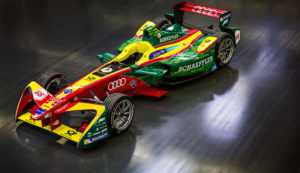Why Audi Is Quitting Le Mans to Focus on Electric Car Racing

Audi has won the famous endurance race 13 times in 18 years.
Audi will end its involvement in the prestigious Le Mans sports car race next year after almost two decades to focus on racing electric cars, symbolizing a shift in strategy as parent company Volkswagen battles to recover from an emissions scandal.
Audi, which is seeking to boost the share of zero-emission vehicles to at least a quarter of its global sales by 2025, said it will start competing next year in the Formula E electric-car racing championship.
“We will conduct the race for the future electronically,”
Chief Executive Rupert Stadler told workers at Audi’s sports car division on Wednesday, according to a statement from the company, citing the biggest transformation in the brand’s history.
“As our production cars are becoming increasingly electric, our motorsport cars, as Audi’s technological spearheads, have to even more so,”
the CEO said.
As it grapples with the costs of the emissions scandal, the German carmaker is cutting spending to fund its shift to electric cars and autonomous driving, mirroring plans by parent Volkswagen VLKAY 0.74% .
Audi denied a report in Germany’s Handelsblatt newspaper that savings from pulling out of Le Mans and the World Endurance Championship (WEC) would amount to an annual 300 million euros ($328 million). A source at Audi said the move would save Audi nearly 100 million euros per year.
VW’s flagship luxury division has set aside more than half a billion euros to cover costs for the diesel emissions scandal and possible recalls of cars fitted with Takata Corp airbags. Third-quarter financial results are due on Friday.
Le Mans, one of the greatest tests of endurance for cars and drivers, has been a source of prestige for Audi which has won the race 13 times in 18 years.
The decision to exit the WEC means Audi will be left with no diesel engines in motorsports, a spokesman said.
It also leaves the WEC with just two manufacturers competing for the championship: Audi’s VW stablemate Porsche, which has won for the past two years with hybrid models, and Toyota.
Toyota said in a statement that it noted Audi’s decision “with regret” but it would have no effect on the company’s plans.
“We are preparing for 2017 when we will return with the target of winning the Le Mans 24 Hours and the World Championship,” a spokesman for the Japanese company said.
A Porsche spokesman said it also had no plans to quit.
More than a year after VW admitted to rigging emissions tests, Audi’s move is another setback for diesel which analysts have said faces higher costs amid tougher standards and testing methods.
But Audi said its exit from top-level sportscar racing does not imply diesel technology will disappear in its road cars.
“If we are serious about achieving carbon dioxide (CO2) emission targets, then there is no alternative to diesel because they are the most efficient engines,” the spokesman said.
Audi will continue to compete in Germany’s DTM touring car championship where it will switch from an 8-cylinder to a 4-cylinder petrol-drive car in 2018.
Separately, Audi is looking at the possibility of expanding its engagement in the RX World Rallycross championship where it may replace its 4-cylinder petrol model with an electric model, a spokesman said.
Audi’s decision is also a boost for Formula E, which has attracted interest from other manufacturers including German rivals BMW and Mercedes as well as Renault, Jaguar, Citroen and India’s Mahindra.
“I was as surprised as anyone, probably,” Formula E Chief Executive Alejandro Agag told Reuters. “It is confirmation that Formula E is going in the right direction.”
